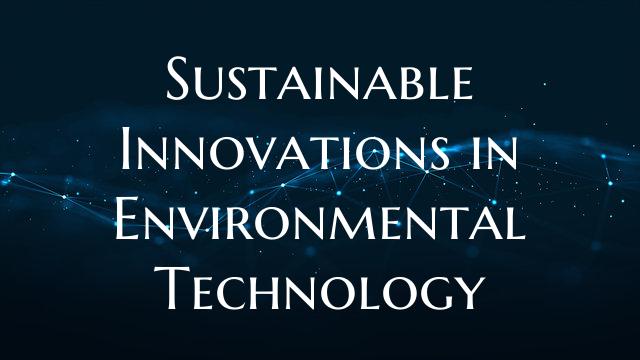Sustainable Innovations in Environmental Technology
In recent years, the imperative for sustainable innovations in environmental technology has gained significant momentum as societies worldwide seek to address pressing environmental challenges. From climate change to pollution, the need for innovative solutions that promote sustainability and mitigate environmental impacts has never been more apparent.
One of the key areas where sustainable innovations are making a profound impact is in renewable energy technologies. Technologies such as solar panels, wind turbines, and hydropower systems are revolutionizing the way we generate energy by harnessing clean, renewable sources. These innovations not only reduce our reliance on fossil fuels but also significantly decrease greenhouse gas emissions, thereby combating climate change.
Another pivotal aspect of sustainable innovations in environmental technology lies in waste management and recycling processes. Advanced recycling technologies are enabling the repurposing of materials that were once considered waste, leading to a more circular economy and reducing the strain on natural resources. Furthermore, innovations in waste-to-energy technologies are providing sustainable means of converting waste materials into energy, minimizing landfill waste and potential environmental harm.
Water management is also a critical focus area for sustainable innovations in environmental technology. Advanced water purification systems, desalination technologies, and water recycling processes are essential for ensuring clean and accessible water sources for communities while preserving water resources for future generations. These innovations play a vital role in addressing water scarcity challenges and promoting sustainable water use practices.
Additionally, advancements in sustainable agriculture technologies are transforming the way food is grown and harvested. Techniques such as precision farming, vertical farming, and hydroponics are enhancing crop yields while minimizing environmental impacts such as soil degradation and water pollution. By promoting resource-efficient and eco-friendly agricultural practices, these innovations contribute to sustainable food production and help meet the growing global food demand.
In conclusion, sustainable innovations in environmental technology are crucial for building a more sustainable future for our planet. By continuously developing and implementing cutting-edge technologies that prioritize environmental conservation, we can address environmental challenges, promote resource efficiency, and safeguard the health of our planet for generations to come. It is through sustainable innovations that we can strive towards a more harmonious relationship between technology and the environment.

